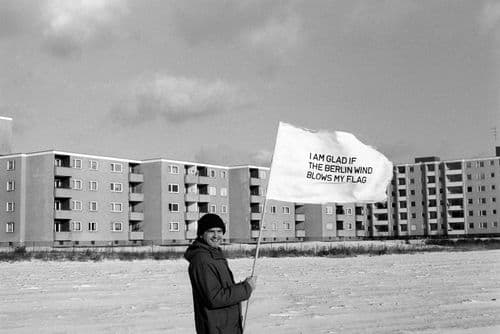Shifting Perspectives: If the Berlin Wind Blows My Flag
Please note that exceptionally, on Saturday, February 28, due to a private event, the exhibition will close at 2 PM.
Shifting Perspectives: If the Berlin Wind Blows My Flag
The Story of a West Berlin Fellowship
In 1963, a unique artists’ residency program was launched by the US Ford Foundation, in West Berlin, soon taken over by the German Academic Exchange Service (Deutscher Akademischer Austauschdienst, DAAD). The Artists-in-Berlin Program (Berliner Künstlerprogramm des DAAD, BKP) aimed, on the one hand, to bring international artists to West Berlin in order to overcome the city’s “cultural isolation,” and, on the other, to provide opportunities for artists to engage with a more international audience—many of whom also felt isolated by the political and cultural constraints of their own countries. Numerous participants came from Central and Eastern Europe, crossing the divide created by the Iron Curtain, to reach a city that was itself the most potent symbol of that very division.
Following the 2023–2024 exhibition If the Berlin Wind Blows My Flag. Art and Internationalization before the Fall of the Wall in Berlin, which examined the history and politics of the BKP, a new iteration of the project will open in December 2025 at Galeria Centralis of the Blinken OSA Archivum, in Budapest. Under the title Shifting Perspectives: If the Berlin Wind Blows My Flag. The Story of a West Berlin Fellowship, this continuation of the project extends the critical reflection on the cultural and institutional dynamics of the Cold War to a Central and Eastern European context.
Drawing on the archival holdings of both the BKP and the Blinken OSA Archivum, the exhibition investigates the interplay between political institutions and artistic practices beyond a Western framework. It focuses on the role of funding bodies like the Ford Foundation, the International Association for Cultural Freedom, and the DAAD in fostering dialogue between Eastern European and Western artists and intellectuals. More than 30 Hungarian cultural practitioners—artists, writers, composers, film directors—such as Gábor Bódy, Péter Esterházy, György Jovánovics, György Kurtág, László Lakner, István Szabó, and Endre Tót, participated in the BKP before 1989, indicating the extent of cross-border artistic engagement despite geopolitical divides.

The exhibition builds on the project’s strategy of exposing gaps and omissions in institutional narratives. Particular attention is given to the contributions and visibility of women artists—linking pioneering figures such as Bettina von Arnim, Dóra Maurer, and Zofia Kulik with contemporary perspectives by Dominika Trapp, Tanja Ostojić, and Ieva Epnere. It further highlights female artists from state-Socialist countries, whose work would have been equally worthy of support within the framework of the BKP due to its relevance and quality. By revisiting artistic practices and forms of representation in archival narratives, the exhibition seeks to reimagine the cultural geography of the period and challenge hierarchies of recognition.
Shifting Perspectives also traces alternative art networks that transcended ideological boundaries through common artistic approaches, such as the Mail Art movement or the Workshop of the Film Form (WFF) in Łódź. A case study of Jürgen Schweinebraden’s EP Galerie in East Berlin, which connected artists from both sides of the Iron Curtain—including Dóra Maurer, Jiří Valoch, and Charles Simonds—serves as a model for artistic solidarity and civic engagement.
The Budapest edition will be complemented by collaborations with contemporary artists who engaged directly with the archives as artistic material: Sonya Schönberger, Alicja Rogalska, Timmi Kwaku Davis, and Yehudit Yinhar developed new works that question mechanisms of exclusion, the politics of memory, and the ethics of care and recognition.
Through this dialogue between archives, generations of artists, and audiences, Shifting Perspectives aims to articulate new narratives of transcultural attitudes—ones that emerge from shared histories and the potential of art to envision forms of solidarity across time and space.

Curated by Nóra Lukács and Melanie Roumiguière
Preliminary list of artists: Bettina von Arnim, Endre Bálint, Ákos Birkás, Gábor Bódy, Wojciech Bruszewski, Daniel Buren, Vlassis Caniaris, Timmi Kwaku Davis & Yehudit Yinhar, Agnes Denes, Ieva Epnere, Wojciech Fangor, György Galántai, Gyula Gulyás, István Haász, Gusztáv Hámos & Katja Pratschke, István Harasztÿ, Joan Jonas, György Jovánovics, Shigeko Kubota, Zofia Kulik (KwieKulik), László Lakner, Dóra Maurer, Maina-Miriam Munsky, Hajnal Németh, Tanja Ostojić, Robert Rehfeldt, Józef Robakowski, Alicja Rogalska, Sonya Schönberger, Shelly Silver, Charles Simonds, Antonio Skármeta, Endre Tót, Dominika Trapp, Jiří Valoch, Ryszard Waśko, Ruth Wolf-Rehfeldt
Supported by ifa – Institut für Auslandsbeziehungen
Partners: DAAD Artists-in-Berlin Program; Neuer Berliner Kunstverein (n.b.k.)